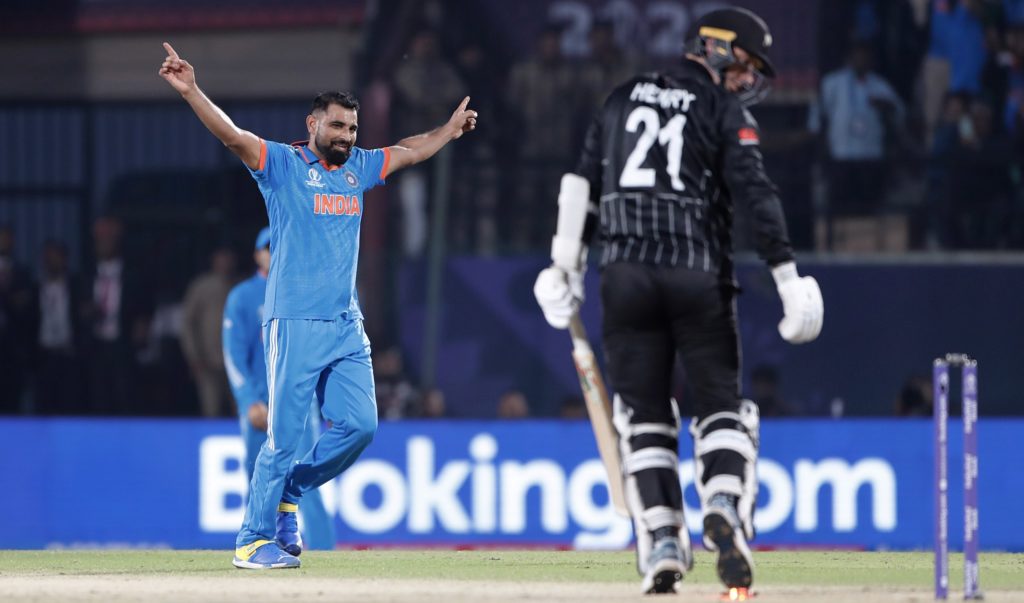India may be the outstanding team at the World Cup but coach Rahul Dravid has warned Wednesday’s semi-final against New Zealand in Mumbai represents the “pointy end in a tournament”.
Sunday’s 160-run defeat of the Netherlands left hosts India with a perfect played nine, won nine record – the first time any side had achieved such a feat at a World Cup featuring a round-robin format.
India are well-stocked in all departments, with star man Virat Kohli the tournament’s leading batsman with 594 runs and captain Rohit Sharma not far behind on 503.
The experienced duo have scored three hundreds between them, while the likes of Shreyas Iyer and KL Rahul both appear to be coming into form at the right time following their centuries against the Netherlands.
Meanwhile, India boast a formidable fast-bowling lineup in Jasprit Bumrah, Mohammed Siraj and Mohammed Shami.
If successful teams are fortunate as well as good, then India certainly had a lucky break when an injury to all-rounder Hardik Pandya paved the way for Shami’s return, with the experienced seamer having since taken 16 wickets in five matches at a stunningly low average of under 10.
In addition spinners Ravindra Jadeja and Kuldeep Yadav are also capable of taking wickets without being flogged for runs.
And yet the fact remains India have been waiting since a 2011 triumph over Sri Lanka in Mumbai to win a third World Cup title, while their last major piece of silverware was the 2013 Champions Trophy.
Four years ago, New Zealand defeated India by just 18 runs in a rain-affected World Cup semi-final in Manchester that spanned two days, with the Black Caps also beating India in the inaugural 2021 World Test Championship final.
Five of the India side who featured in the 2019 semi-final – Rohit, Kohli, Rahul, Bumrah and Jadeja – are set to be involved again on Wednesday.
“You’re at a pointy end in a tournament now,” said Dravid. “There is going to be certain amount of pressure but I think the way we have responded to the pressure so far gives us a lot of belief.”
Dravid’s argument is supported by the manner of India’s four-wicket win against New Zealand in the league stage in Dharamsala last month.
Despite Daryl Mitchell’s 130, India held New Zealand to 273, with Shami taking 5-54 before Kohli made 95 and Jadeja, demonstrating his big-match temperament, a valuable 39*.
Wednesday’s match takes place at Rohit’s Wankhede Stadium home ground, where India bowled out Sri Lanka for just 55 to win by 302 runs in the league stage, with the aggressive 36-year-old opener leading from the front at what could be his last World Cup.
“Rohit has certainly been a leader, without a doubt,” said India batting great Dravid. “He’s cracked open games for us.
“We’ve talked about playing in a particular way. You cannot do that unless your leader really buys in and actually shows by example.”
New Zealand, in contrast to India, are in the semi-finals despite losing four of their nine league games.
But they now have a clean slate, with captain and key batsman Kane Williamson, following an injury-plagued tournament, returning to form with 95 on his comeback against Pakistan.
A proven pace trio of Trent Boult, Tim Southee and Lockie Ferguson are capable of succeeding against even the strongest batting lineup, with miserly left-arm spinner Mitchell Santner (16 wickets at under 25) an often under-rated threat.
Runners-up at the last two World Cups, New Zealand also boast a break-out rising star in Rachin Ravindra, with the 23-year-old left-hander having already scored 565 runs.
The son of Indian-born parents, Ravindra is also the first New Zealander to compile three hundreds at a single World Cup, with his century on tournament debut against England followed by further three-figure scores against Australia and Pakistan.
“You dream of playing against India and a full crowd at the Wankhede, a ground with so much history,” said Ravindra. “We’ll stay level, we’ll try our best. We know we can’t win every game of cricket …but we’ll see how it plays out.”
ALSO: Starc warns Proteas – Aussies peaking at right time
© Agence France-Presse







